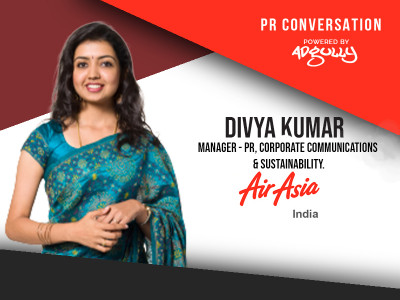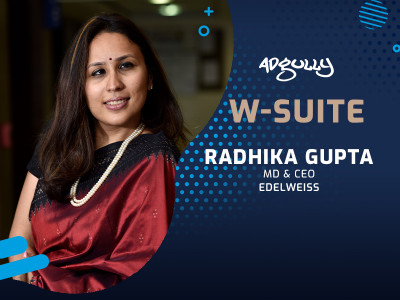Opportunities for women have been envisioned differently: Divya Kumar
We, at Adgully, have always saluted and honoured women managers and leaders across diverse fields. Last year, we launched our unique and distinct program, called WOMEN DISRUPTORS, which drew a lot of attention and was highly appreciated by the industry. W-Suite is a special initiative from Adgully that has been turning the spotlight on some of the most remarkable women achievers in M&E, Advertising & Marketing, PR & Communication industry. In the refurbished series, we will find out how women leaders have been managing their teams and work as well as how they have been navigating through the toughest and most challenging times brought about by the global pandemic.
In conversation with Adgully, Divya Kumar, Manager – PR, Communications & Sustainability, AirAsia India, speaks about the evolution of women in leadership roles and the defining qualities of a successful woman leader in today’s business ecosystem. At the same time she also draws the attention to the gender pay gap that continues to persist in the industry.
How would you define today’s woman leader?
Today’s women are highly driven by ambition, self-esteem and dynamic. Many women lead by example, are vocal about their learning’s and experiences, and are open to embracing change. Women in leadership have evolved through their multifaceted roles and have the ability to juggle endless commitments while delivering exceptional value to each one of them. Not only are they a source of motivation for their co-workers and contemporaries, but they are also empathetic, attentive and accommodative of their needs.
What are the foremost attributes that women leaders in today’s business ecosystem must possess?
Female leaders have been inspiring generations of women across fields, to come to the forefront and grow in their careers. Women who lead should be enablers and motivators. They should possess the ability to inspire people while also being empathetic and understanding of their personal and professional goals. Managing people is an acquired skill and women leaders need to be assertive and showcase their independence in making impactful decisions. It is of utmost importance now, for women to stand up for, and support each other unconditionally, so as to create safe and inclusive workplaces. Women leaders should inspire, empower and enable more women to excel in their areas and create a strong position for themselves professionally.
Despite the qualifications, aptitude and experience, why do you think we don’t see the expected number of women business leaders, especially when it comes to boardroom decision-making?
There are several reasons for the paucity of female business leaders, especially in positions of power. For eons now, people have been conditioned in a certain manner while hiring women. Opportunities for women have been envisioned differently, outside the purview of leadership positions, despite their qualifications and experience. However, there is indeed a wave of change that has been taking place over the last few years.
We are evolving and adapting to the times where women do not hesitate to claim their rightful place. Organisations are extending inclusive and open policies that are encouraging women to take strides in their careers after breaks, through special trainings and programmes, as well as through sensitisation. Standardising employee retention policies, as well as ensuring that individuals returning from maternity and paternity breaks have a seamless back-to-work process is crucial to that end.
What more do Indian corporates need to do to encourage and groom women leaders?
Indian corporates are becoming progressive and have evolved into workplaces of the future that emphasise on collaboration, diversity, equity and balance. This is a great step towards empowering not only women, but individuals from varied backgrounds and orientation. Organisations need to create opportunities that engage their employees, give them a platform to voice their views, create open and accepting forums for dialogue, conduct sessions on imperative topics such as unconscious bias, gender equity, upskilling, and the like. Women need more opportunities to see the world and expand their horizons. Investing in a sound L&D infrastructure is yet another step towards grooming potential leaders.
According to you, what are the Do’s and Don’ts for today’s women to break through the glass ceiling?
Women have been quite successful in bringing about positive change to organisations and specifically in their respective fields, and thus the glass ceiling does not have the same connotation as it did earlier. However, for women to excel and go above and beyond in their roles, it is imperative to capitalise on their talent and potential, be efficient and manage time well, be prepared and well equipped for their roles, actively seek out mentorship and establish their boundaries. Own your failures but don’t face the heat for others’ faults. Be open to change - Falling into a comfort zone is a big no!
How acute is the gender pay gap issue in India today? What needs to be done to address this in an effective manner?
The gender pay gap issue has been prevalent in the country, and organisations and individuals have endeavoured towards countering it and creating a more equitable and fair balance. Women need to hone their skills in negotiation and persuasion to ensure that they are able to speak for themselves and ask for what they deserve. People deserve to be paid for the value that they bring into their work and to their organisations. This issue can be addressed through open channels of communication and advocacy for equity and equality to arrive at the right balance.
What are the five most effective lessons that you have learned as a woman leader?
During my journey as a female leader, I have learnt various lessons which have shaped my experiences and my growth in the industry, as well as in my organisation. The five lessons that I will always carry with me are:
− To address and resolve issues quickly
− Diving deep into the heart of the matter and ensuring closure while dealing with crises
− Being open to constructive criticism. Ask questions, challenge and be inquisitive
− Understanding and being in tandem with one’s own job and duties. Personality is as important as skill set
− Being level headed and taking a balanced stance in decision making, to ensure that emotions do not overcome us
How challenging has it been for you to maintain a balance between career goals and family responsibilities? What is your mantra to maintain that balance?
Maintaining a work-life balance is the cornerstone to developing one’s wellbeing. In doing so, the kind of organisation and the people that one works with are of utmost importance. Organisations are striving to ensure that they are able to render their employees with the space to decide their own work and commitments, and to ensure that those do not stand in the way of their personal time or growth. To be able to maintain a balance between career goals and family responsibilities, people need to deliver inspiration with the kind of work that they do; both personally and professionally. The support from family and a healthy ecosystem at work are important factors that foster this balance. Additionally, it is important to commit to one’s role so that they are able to strike the right balance. Giving your 100% for any job will take you a long way.
How prevalent are the instances of Sexual Harassment in workplaces in India? What should the industry collectively do to tackle such a serious issue?
The understanding of sexual harassment in workplaces, or workplace harassment became more commonplace over the last few years, owing to social media, and issues being brought forward. It is indeed unfortunate that awareness about the gravity of this issue is yet to be found across several sections of people at large. The industry has a collective responsibility to ensure that there are effective, enforced guidelines which ensure that people are safeguarded and secure. Greater training and sensitisation modules need to be utilised to educate people and remove misguided thought. More fool proof and streamlined means of reporting complaints need to be thought of in addition to offering safe and secure options for counselling and rehabilitation should there be a need for external intervention.


















Share
Facebook
YouTube
Tweet
Twitter
LinkedIn